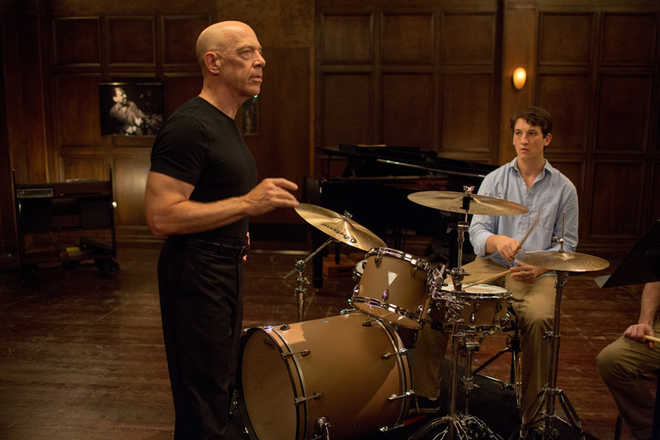Hollywood actor JK Simmons has won the Best Supporting Actor Oscar for his role in Whiplash. In an exclusive conversation, we catch up with him to talk about his role and more.
You play a music teacher in Whiplash and you yourself studied music back in university. Did you ever come across anyone like your own character from the movie?
I can't say like Fletcher, no. I certainly knew some guys who studied under some really brilliant musicians who were perfectionists. But nobody who was as borderline psychopathic and abusive as Fletcher.
Like your character, are you too a perfectionist?
No, not really. In my work I try to get things right, to do it well, and if there are specific skills involved—like in this case conducting or playing the piano, or in this film I have coming up where I play a character who is German—I'm very meticulous about learning the accents and dialects and those kinds of things. That's the closest I come to being a perfectionist.
When did you switch from music to acting?
That was a sort of gradual transition. I was studying music in college. I was singing, I was doing operas and Gilbert and Sullivan operettas, and then I was offered a job as the music director of the Bigfork Summer Playhouse, in Bigfork, Montana. There I ended up playing the lead in one of the four musicals that summer—I played the lead in Brigadoon, 'cause I was sort of the best singer for the part. I worked with a few really, really good directors up there, during that summer and over the next few years, and they began to teach me how to be an actor and respect for the craft—how to take what I was feeling inside and translate it into a character.
When did you feel like, "Okay, this is going to be my full time job?"
Not for a long time. When I got out of college, I moved to Seattle because it was the nearest big city and still didn't know if I wanted to be a composer, conductor, singer or actor. I just got day jobs and auditioned and took what came and the theater doors were the ones opening the most. I got to work with some really good actors and directors in Seattle, doing plays, musicals, and Shakespeare and learning by doing. I think in a way when I got my Equity Card I sort of felt like, "Wow, I will be able to pay my rent by acting."
Does Whiplash feel like another step?
Yeah. So much of my career as a screen actor has been in smaller and supporting roles and this is certainly a supporting role as well, but people refer to this as a two-hander even though there are wonderful characters in it. It's a meaningful part.
Damien mentioned that he was unaware of your musical background when he cast you as Fletcher.
Yeah. We had lunch in L.A. and it was one of those meetings where I felt like trying and pitching myself for the part, and he was going to try to pitch the part to me because Jason Reitman had suggested me for the part. The first he said was, "I don't want you to get nervous or feel overwhelmed by the musical aspect and conducting. We'll find a conductor who will be a technical advisor and teach you how to do all this stuff." And I said, "Let me stop you right there. I've got a degree in music— not jazz, I was never a jazz conductor—but I led pit bands and was a classical conductor and composer and singer, so I am one lucky step ahead on that. And it was the same with Miles, too. Miles had been playing drums since he was 15 years old.
Whiplash was shot in an unbelievably short space of time…
19 days! And you know, I had it easy, I only worked 15 or 16 of those days. It's Miles's movie, he was there all day, every day, and the crew, God bless them, they had banked a lot of overtime during the first week, by wrapping in 12 hours, so for that first week we were thinking, “Oh, this is a piece of cake!' But then that last week, we were working like 17, 18 hours a day, and as Miles says, it's a lot easier to just be exhausted than to pretend to be exhausted on-screen.
Fletcher is a fairly mysterious figure — did you have a back story in mind for your own reference?
Yeah, I had some, and we actually spend the better part of a day shooting scenes of Fletcher in his apartment by himself. It was really the only time the film ever went away from Miles's point of view, which is why it ultimately was excised from the film. There were some little hints there about a back story for Fletcher and why he was the way he was, seeing a different side of him and also seeing possibilities of why he was such a miserable, unhappy guy.
But I love that in the final cut, none of that exists, and none of it is necessary. We don't need to know more about this guy because the film is Andrew's story, and how he perceives Fletcher is how Fletcher exists in the film.
Unlock Exclusive Insights with The Tribune Premium
Take your experience further with Premium access.
Thought-provoking Opinions, Expert Analysis, In-depth Insights and other Member Only Benefits
Already a Member? Sign In Now










